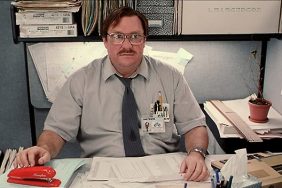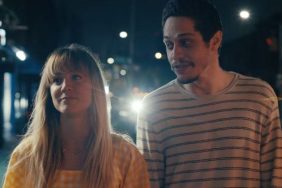Ehren Kruger writes movies about giant robots and revisionist history, and his movies make tons of money. The co-writer of Transformers: Revenge of the Fallen and the writer of Transformers: Dark of the Moon and this weekend’s Transformers: Age of Extinction is, in some ways, the keeper of all the keys to this strange blockbuster franchise. Each film begs many questions and the ten minutes we had with Ehren Kruger weren’t nearly enough to cover them all. Besides, he’s sworn to secrecy about a lot of them.
Related: Transformers: Age of Extinction Review: Pure Exhaust
But we had to ask, so here’s our interview with Ehren Kruger about the questions Transformers: Age of Extinction raises about Gods, the nature of the Dinobots, the unknown skill sets of Nicola Peltz, Texas’s “Romeo and Juliet” laws and the mysterious fate of Sam Witwicky, the human protagonist of the first three films who isn’t so much as mentioned in the fourth.
HERE THERE BE MINOR SPOILERS…
CraveOnline: Hey! Bah-weep-Graaaaanagh wheep ni ni bong!
Ehren Kruger: [Laughs.] I’m sorry…?
That was the universal greeting from Transformers: The Animated Movie. I guess it doesn’t work every time.
[Laughs.] You know what…? I gotta tell you… [unintelligible through laughter]…
What was that…?
I watched the animated movie early on when I came into this franchise, and I enjoyed it but I’ve put a lot of it out of my head. [Laughs.] We’ve gone in a different direction. We’ve gone in a different direction, haven’t we…?
You’ve gone in a different direction. Yes, I can admit that. Tell me about how these things get started. This is your second Transformers movie, and at this point do they tell you the initial concept and things you have to put in the movie? And if so, what were those things?
No. This is the third one I’ve worked on, and certainly the last two I’ve worked on on my own. I have pitched the kind of core story. It stayed the core story, but just kind of in its simplest, organic form. Then I start sitting down with Michael [Bay], just the two of us in a room, and we start discussing visual ideas and how the story could lend itself to spectacular sequences. Because he’s a filmmaker, the last thing he ever wants to do is shoot something he’s shot before, or he’s just always looking to push the envelope with what technology can do, effects-wise, and what’s possible to do in an action sequence. No matter idea I will pitch him it will come out bigger. [Laughs.]
What was that initial concept, the short form, or the germ of it?
The short form germ of this one was a creation story. It was a story about human scientists trying to break the genome of Transformers and wanting to play God, and then through that theme exploring who [originally] did play God in terms of where these Transformers and Cybertron and their beginnings came from, setting that up, and then through that theme it led us to this other story of a creator or an inventor on a very small, underdog scale, which led us to the character of Cade Yeager.
So this is something that you’re setting up in future films? In future films we’ll see God?
[Thinks.] No, I wouldn’t call it “God,” per se, but certainly this film talks about a person or persons, a group, that is referred to as “Creators,” and if this film is successful and people would like to see future stories, I imagine that they would be very interested in seeing what powers would have the ability to create these Transformers in the beginning. Certainly something that would be interesting to explore.
I found myself curious if we’re going to find out that those Creators created humans too, because our histories seem increasingly interlocked with every successive movie.
Mm-hmm. Mm-hmm. Well, it’s an interesting question. An interesting question. We’re one of many-many planets in the universe, right? Why do we keep crossing paths? It’s an interesting question.
Is that something you have to do in every Transformers movie now? One movie says all our technology was made from Transformers, and the Pyramids were Transformers, and now the dinosaurs were Transformers… some of them. Is that one of the tropes? Is that a requirement?
So far it seems to be one of the tropes. It seems to be one of the fun elements that the audience responds to and that we like. So it’s not something we have to do. It’s something we like to do.
So you’re shifting gears in this film. You’ve got new human characters. But you never actually mention in the film, maybe in the script I don’t know, what happened to Sam. Was there a line of dialogue that got cut where you addressed that?
I don’t think it ever made the script. I think we talked about at one point referring to the “Witwicky Incident,” but it never made it, yes.
Do you have any ideas about what he’s doing right now? Because he seemed really eager to be part of the Autobot experience in the previous film, so I wonder how he feels about all this.
Well, the reason we ended up not wanting to talk about that too much was that we liked the idea of venturing into this franchise from the perspective of humans on the outside, like the audience, that have just sort of watched these events unfold through the news and through television, and who didn’t know any of the characters or experience the first three things. So they’re coming into this with entirely fresh eyes, without an awareness of things that went on in the previous three films, and well, we liked the purity of that. So we didn’t want [get hung up] with the characters who had been in the previous three.
Tell me about the new characters. One line of dialogue that gets tossed out about Tessa, for example, is that she’s a really good navigator for a racecar driver. I was wondering if you were going to do more with that originally, or if you were planning to do more with that in future films?
We certainly could. There was a moment when she asks her day [if she could] go out on a ride with her friends, and the idea of that is the kind of ride she was actually going on, so yeah… We think there are a lot of [laughs] talents or skills that she has that her father is not yet aware of.
Did you have to do research on Texas’s “Romeo and Juliet” laws, or did you already know that? That was an interesting moment.
[Laughs.] Yes, there was some research done on that. Yes.
That was interesting that he keeps that in his wallet. This has come up before.
That’s a good policy, don’t you think?
I would imagine so. Well, it worked out.
Yes.
We don’t get to spend a lot of time with the Dinobots, even though they’re a huge part of the marketing campaign. One of the questions I had about them that the film doesn’t quite answer, specifically, is why do they transform into dinosaurs? Were they hiding out on Earth as dinosaurs? Like… infiltrating dinosaurs? What is the thought process on that?
Well we had some more story and exposition on that topic that didn’t make it into the final film, that may yet be explored in future films, so I’m afraid I’d rather not spoil it now.
I respect that. Are you officially writing Transformers 5 at this point? Is that confirmed?
No, we finish this these barely two weeks before they screen, so everybody just takes a beat and [will] see how the audience responds to this, and then we kind of all decide if we’re going to saddle up again. But I love this universe and we’ve certainly been talking about storylines for future episodes, and some things that we’ve hopefully set up with this one we’d like to pay off later on. It’s up to the audience and it’s up to the fans, if they like the movie. We all love this universe.
If the fans like the movie, does that just give you carte blanche to do whatever you want in the next one? Or are you paying attention to how they respond, and that would affect how you write the next one? Like, “Oh, no one liked Galvatron. We won’t bother with him next time.” That seems like something you’d have to deal with regardless, right?
Well, certainly Michael will make the movie that he feels is the most entertaining movie he can make. If there are things he loves about this movie that he wants to bring back then he’ll bring them back. If there’s things he doesn’t love so much then he won’t bring them back. Then if the audience jives with that, it may turn out that way. But if he loves something and we love something that is not everyone’s favorite thing, then it may return. [Laughs.] We’re definitely aware. We sit with the audience. We know when they laugh and we know when they cheer, and that’s what we’re hoping they’ll do. If they cheer at something we’ll know we did our job, and we’re going to try to do that next time.
Read More Exclusive Film Channel Interviews:
William Bibbiani is the editor of CraveOnline’s Film Channel and the host of The B-Movies Podcast and The Blue Movies Podcast. Follow him on Twitter at @WilliamBibbiani.
Read More Exclusive Film Channel Interviews
-
Planes: Fire & Rescue - Dane Cook's Ninja Interview

Comedian Dane Cook goes full ninja while talking Planes: Fire & Rescue and disproving our theories of the vehicular apocalypse.
-
Sex Tape: Jason Segel & Cameron Diaz on Deleted Sex Acts

The stars of Sex Tape act out a sexual situation that got cut from the finished film. Here's a hint: donkeys.
-
Planes: Fire & Rescue - Julie Bowen Interview

Julie Bowen explains why her Emmy could beat up an Oscar while talking about Planes: Fire & Rescue.
-
Sex Tape: Rob Corddry & Ellie Kemper on Sequels

The co-stars of Sex Tape reveal their ideas for a sequel starring their supporting characters.
-
Boyhood: Ellar Coltrane on Vanquishing Social Media

Just like his on-screen counterpart, the star of Richard Linklater's Boyhood really does think that social media is evil.
-
Deliver Us From Evil: Edgar Ramirez Performs an Exorcism

EXCLUSIVE VIDEO: Watch Deliver Us From Evil star Edgar Ramirez perform an exorcism on host William Bibbiani.
-
Deliver Us From Evil: Olivia Munn Pickle Interview

EXCLUSIVE VIDEO: Watch Deliver Us From Evil star Olivia Munn offer to do unspeakable things to William Bibbiani with a pickle.
-
Boyhood: Patricia Arquette Talks Momhood and Armpits

Boyhood star Patricia Arquette compares making a movie over the course of 12 years to starring in "Medium," and relives a moment from Flirting with Disaster.
-
Earth to Echo: Director and Screenwriter Interview

Director Dave Green and screenwriter Henry Gayden discuss the robot’s homeworld and say they wanted more swearing.
-
Transformers: Age of Extinction: Ehren Kruger Interview

The screenwriter answers our questions about the film’s new sci-fi theology and the mysterious fate of Sam Witwicky.







